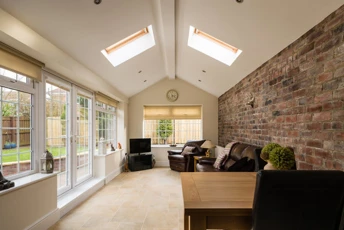Something that people ask us a lot is: should I remortgage? Is now the right time? Here are some reasons why you might want to remortgage:
- You are looking to go on a better rate
- Your current fixed rate deal is up for renewal
- You want to move from an interest-only to a repayment mortgage
- You want to be able to make overpayments
- You want to borrow more money
Very rarely do homeowners take out a mortgage and stick with it for the whole term until it's all paid off. In fact, most mortgages are set at a fixed-rate for a predefined period of time, and once that fixed-rate period ends, it moves to the lender's standard variable rate (SVR).
Going onto a lender's SVR is often more expensive, and doesn't work out to be economical in the long run, so remortgaging is the go-to solution.
You can remortgage early if you want to take advantage of a better rate, make overpayments, or borrow more money.
You may have to pay an early repayment charge to your existing lender if you remortgage.
Why might I think about remortgaging?
Each household is different and there are various reasons why you might look to remortgage. Perhaps you want to borrow more money, or maybe you’ve seen a better rate that you’d like to switch to.
Want to be on a better rate?
There may be opportunities for you to save money by remortgaging. Just be aware that sometimes, the lender will ask you to pay an early repayment charge before you can switch. It’s important to weigh up the price of the early repayment charge against the costs you’ll be saving with the lower interest rate.
A mortgage adviser will be able to help you decide whether it's the right time to remortgage for your unique needs. Get in touch with us and we'll talk you through all your options.
Your current fixed deal is up for renewal
If your mortgage is ending in the next six months, get in touch with us. We can help you find something that works for you. If mortgage rates drop during these six months, we'll let you know.
If you took out a fixed rate mortgage where you pay the same amount every month and the interest rate remains the same, once the initial term has ended, you’ll fall onto an SVR, where you could end up paying a higher interest rate than you were previously.
Make sure you're aware of your deal ending a few months before it actually does, and arrange a new mortgage before it expires to ensure you don't end up paying more than you need to.
You want to move from interest-only to repayment
Perhaps you’re on an interest-only mortgage and want to move to a repayment mortgage. Your lender may need to check your affordability again to ensure you can meet the monthly repayments as well as the interest. It could be as simple as changing without the need to remortgage, but if they can’t offer you the deal you want, then you might consider a full remortgage.
Find your mortgage
Our mortgage finder searches thousands of deals, so you can rest assured we'll always find the right one for you.
Representative example: A mortgage of £ payable over years, total cost for comparison APRC %. Total amount payable £ includes interest and product fees (Fee total £).
Repayments: months of £ at % (variable), then months of £ at % Standard Variable Rate (SVR).
Early repayment charges may apply.
Representative example: A mortgage of £ payable over years, total cost for comparison APRC %. Total amount payable £ includes interest and product fees (Fee total £).
Repayments: months of £ at % (variable), then months of £ at % Standard Variable Rate (SVR).
Early repayment charges may apply.
Representative example: A mortgage of £ payable over years, total cost for comparison APRC %. Total amount payable £ includes interest and product fees (Fee total £).
Repayments: months of £ at % (variable), then months of £ at % Standard Variable Rate (SVR).
Early repayment charges may apply.
Borrowing more money
If you're looking to make home improvements, whether to improve your home for your own benefit or market appeal, the costs of improvements can quickly add up.
You could consider remortgaging if you have enough equity in your home to cover the costs of the renovations. Do your research and consider whether paying the early repayment charge is better than taking out a separate loan.
Your lender will likely want to know what you intend to use the money for and may ask to see builder’s quotes as evidence.
Do I pay more money when I remortgage?
This depends on the lender, and why you are choosing to remortgage. Sometimes the lender will require you pay an early repayment charge before you switch, which does add to the overall cost of remortgaging. However, this may be offset over time by the lower interest rate you find with a different lender.
For the most part, homeowners tend to remortgage to take advantage of their improved rate as they near the end of a fixed term mortgage deal. This better loan-to-value allows you to make reduced payments over the new mortgage term, and can have a positive impact on your monthly budget.
Do I need to remortgage?
No, you don't have to remortgage, but you will likely end up paying more in the long run if you don't. Remortgaging can help free up money, reduce your monthly bills, or help you finance big home improvements.
If the question is, "should I remortgage?" talk to a mortgage adviser. They can take a look at your individual circumstances and help you come to a decision that suits your unique needs.
If you want to know more, read up on how remortgaging works or feel free to read our remortgage FAQs. If we don't cover any of your questions there, feel free to get in touch with us and our experts will be happy to help.
Important information
Your home may be repossessed if you do not keep up repayments on your mortgage.
There may be a fee for mortgage advice. The actual amount you pay will depend on your circumstances. The fee is up to 1% but a typical fee is 0.3% of the amount borrowed.
Related Articles
Getting ready to remortgage
Timing is key when it comes to remortgaging, and it’s never too early to start thinking about it.
How to become mortgage free
Do you want to become mortgage free? Read our top tips for paying off your mortgage early.
A guide to extending your home
Are you considering an extension to give you that extra bit of space but not sure what to do?
No posts currently available




